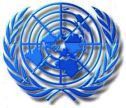UN Security Council Debates Climate Change and Security

New York, 20 July 2011
On 20 July 2011, the United Nations Security Council held an open debate on the ?Maintenance of international peace and security: impact of climate change? led by Germany which held the Presidency of Security Council in July.
With this debate, Germany wanted to create a firmly established place on the Security Council agenda for climate and security, a topic which is crucial to the future of mankind. The debate centred around the security-related effects of climate change: rising sea-levels and the resultant security risks, as well as food security.
"We can already see how scarcity caused by climate change results in conflict over the control of resources - which can in turn lead to violence, war and destruction. This is a point, - said Minister Westerwelle ahead of the debate, - which we want to address, and we intend to launch the long-term process of doing so."
Support for holding the debate came from an alliance of small island nations that feel threatened by rising sea levels. That group also wants the Security Council to regularly debate climate change and to appoint a special adviser to investigate the risks to national sovereignty that global warming may pose.
Prior to the session, securitycouncilreport.org reported that, ?There is growing understanding that specific conflicts may have climate change related aspects.? The site stated that ?Compared to the impression left four years ago, there seems to be less resistance to having the debate on the Council?s agenda, as is evident by the name given to the agenda item itself, linking climate change to security issues. Some members think that this may be due to the fact that since the debate in 2007, more scientific evidence has been produced on the long-term ramifications of climate change and some have linked recent conflicts to the rising prices of basic foodstuffs and diminishing water resources.?
The Security Council previously held a high-level debate on the energy-climate-security nexus on 17 April 2007. At that time, the UK held the Presidency of the Council.
An article in the Scientific American said that ?Initially, opponents to the U.K.-hosted deliberations (in 2007) charged that the council was pressing into a topic that was a matter for the General Assembly and the U.N. Framework Convention on Climate Change (UNFCCC) alone. Others felt that it was odd to add to the Security Council's workload. Coalitions representing more than 100 developing countries sent formal letters of complaint. The debate was held regardless, but the sharp criticisms shut down the possibility of a follow-up meeting.
"Two years later, the General Assembly adopted a resolution asking all U.N. organs to examine the implications of rising global temperatures in a way that fit their various operating mandates."
In follow-up to this request, Germany called for the debate in July stressing that the council will only discuss the "security implications" of climate change, with a special focus on the possible threat faced by small island states and coastal states due to rising sea levels ? as well as food security implications.
Extracts from the debate:
Speaking on behalf of the Pacific small island developing States, the Maldives, Seychelles and Timor-Leste, was Marcus Stephen, President of Nauru. ?The Council, he insisted, should start by requesting the appointment of a special representative on climate and security, as well as an assessment of the United Nations capacity to respond to the security impacts of the phenomenon. The Council would render itself irrelevant if it chose to ignore the biggest security threat of our time, he said, imploring it to ?seize this opportunity to lead?.
?Bolivia?s representative went a step further, calling for creation of an international tribunal for climate and environmental justice to sanction those nations that did not comply with emission reduction commitments. He also proposed a Council resolution to cut global defence and security spending by 20 per cent and channel the subsequent savings into steps to tackle climate change.?
"Abdullah Hussain Haroon ( Pakistan), associating with the Group of 77, considered today?s debate an important contribution to the search for solutions within the UNFCCC-led process. In a wide-ranging description of the perils of global warming, he said that conflict, and not cooperation, was fast becoming the world condition. ?If we are to have any chance at disaster prevention or consequence management, we must act quickly and decisively," he said, as coming catastrophes would exacerbate current conflicts.
"Today, he said, climate change was an inescapable reality for Pakistan, which was manifesting itself with increasing ferocity. His country was among the worst victims of ?climate injustice?, and dealing with the phenomenon was an imperative. Against that backdrop, climate change affected almost all sectors of the country, including water resources, energy and agricultural productivity. With that, he underlined the vital work undertaken by the UNFCCC, stressing the importance of the mandates of the United Nations principal organs and the need for the Assembly and the Economic and Social Council to retain their pre-eminence."